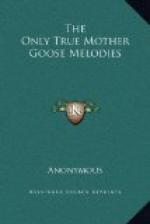By the record of marriages in the City Registrar’s office, it appears that in “1715, June 8, was married by Rev. Cotton Mather, Thomas Fleet to Elizabeth goose.” The happy couple took up their residence in the same house with the printing office in Pudding lane. In due time their family was increased by the birth of a son and heir. Mother Goose, like all good grandmothers, was in ecstasies at the event; her joy was unbounded; she spent her whole time in the nursery, and in wandering about the house, pouring forth, in not the most melodious strains, the songs and ditties which she had learned in her younger days, greatly to the annoyance of the whole neighborhood—to Fleet in particular, who was a man fond of quiet. It was in vain he exhausted his shafts of wit and ridicule, and every expedient he could devise: it was of no use—the old lady was not thus to be put down; so, like others similarly situated, he was obliged to submit. His shrewdness, however, did not forsake him; from this seeming evil he contrived to educe some good; he conceived the idea of collecting the songs and ditties as they came from his mother, and such as he could gather from other sources, and publishing them for the benefit of the world—not forgetting himself. This he did—and thus “Mother Goose’s Melodies” were brought forth. The adoption of this title was in derision of his good mother-in-law, and was perfectly characteristic of the man, as he was never known to spare his nearest friends in his raillery, or when he could excite laughter at their expense.
Cotton Mather and mother goose thus stand in juxtaposition; and as the former was instrumental in cementing the union, which resulted in placing the latter so conspicuously before the world, it is but just that it should be so,—although the one was a learned man, a most voluminous writer, and published a great many books, some wise and some foolish, it may well be doubted whether any one, or all of them, together, have passed through so many editions,—been read by so many hundreds of thousands, not to say millions,—put so many persons to sleep, or in general done so much good to the world as the simple melodies of the other.
Requiescat.
Goose’s Melodies.
Little boy blue, come blow your horn,
The sheep’s in the meadow, the cow’s in
the corn,
What! is this the way you mind your sheep,
Under the haycock fast asleep?
There was a mad man,
And he had a mad wife,
And they lived all in a mad lane!
They had three children all at a birth,
And they too were mad every one.
The father was mad,
The mother was mad,
The children all mad beside;
And upon a mad horse they all of them got,
And madly away did ride.
Baa, baa, black sheep, have you any wool?
Yes, marry have I, three bags full,
One for my master, and one for my dame,
And one for the little boy that lives in the lane.




